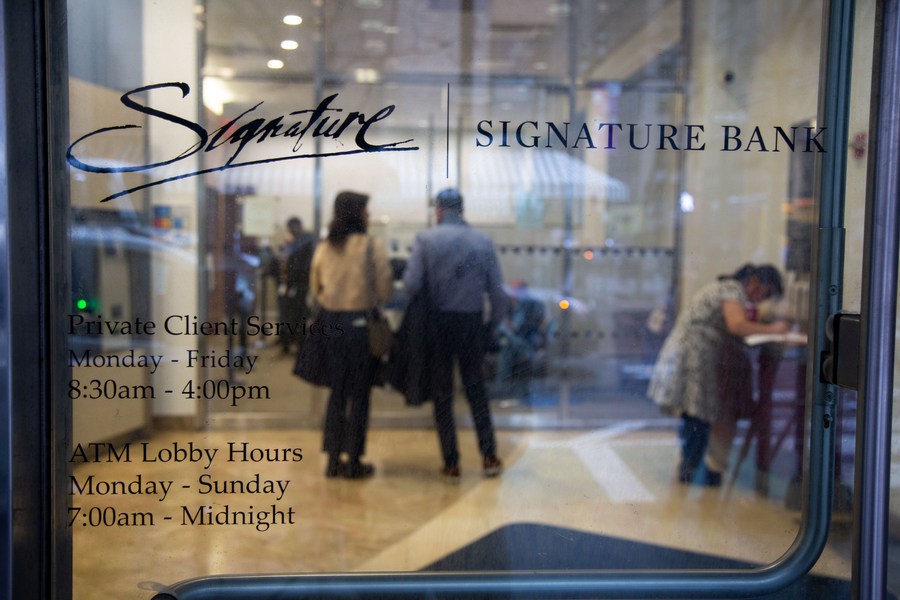U.S., Europe in bank turbulence, triggering fears globally
NEW YORK, March 19 (Xinhua) -- The U.S. banking turmoil starting last week from the nearly simultaneous collapse of tech-focused Silicon Valley Bank (SVB), and two crypto-centric lenders Signature Bank and Silvergate Bank, continued to unfold this week, with the fallout penetrating deeper into the U.S. financial system and spreading to Europe.

People queue up outside the headquarters of the Silicon Valley Bank (SVB) in Santa Clara, California, the United States, March 13, 2023. (Photo by Li Jianguo/Xinhua)
BANKING JITTERS
The downfall of SVB and Signature Bank marked the second-and third-largest bank failures in U.S. history.
Just days after the U.S. Treasury Department, the Federal Reserve and the Federal Deposit Insurance Corporation stepped in to make sure that all deposit accounts at both failed institutions will be guaranteed, another regional lender First Republic Bank is teetering on the brink.
Shares of First Republic Bank have been hit hard in recent U.S. bank tumult. Worrying that the San Francisco-based lender was also on the verge of collapse prompted a consortium of 11 large U.S. banks on Thursday to band together to inject 30 billion U.S. dollars in deposits to quell investor panic.
The rescue attempt initially helped boost sentiment, but on Friday, First Republic Bank shares slumped again, sinking more than 32 percent to finish the week nearly 72 percent lower.
In Europe, Swiss banking giant Credit Suisse is also seeing issues after it revealed it found "material weakness" in its financial reporting and after its largest shareholder, the Saudi National Bank, said it would not provide the bank with any more financial assistance. Its shares slumped to record lows on Wednesday.
Credit Suisse won a 54 billion U.S. dollars lifeline from the Swiss central bank, but its trouble seems far from over.
While Credit Suisse's problems may be distinct, the fact that a European bank is in hot water on the heels of U.S. banking distress rattled markets.
The financial sector and the oil sector took the brunt of the pain for the banking debacles. The SPDR S&P Regional Banking ETF shed 14.3 percent for the trading week ending March 17. Oil prices nosedived to their 15-month lows.

This photo taken on March 13, 2023 shows the exterior view of a First Republic Bank branch in Millbrae, California, the United States. (Photo by Li Jianguo/Xinhua)
FEARS OF MORE WOES
There is a concern of contagion, Brendan Ahern, chief investment officer of U.S.-based asset management firm Krane Funds Advisors, told Xinhua.
"You have a single bank that has very specific problems, but that's affecting other banks," as bank failures challenged confidence in the financial system, he said.
While certain aspects of the SVB situation were unique, the fundamental challenge faced by SVB is also faced by other banks, said UBS analysts.
"Most banks invest customer deposits into mortgages, government securities, and loans held on the balance sheet. Over the past year, the fair market values of mortgages and government securities have fallen as a result of higher interest rates," they noted.
In an attempt to prevent wider contagion, the Fed announced a new emergency loan program called the Bank Term Funding Program. Under this program, debt securities like long-duration U.S. Treasuries could be used as collateral for cash loans for up to a year, giving banks access to liquidity without having to sell securities at a loss.
Despite the efforts, analysts noted that banks will still be faced with a potential duration mismatch between their securities and their liabilities, and the Fed's program is no substitute for maintaining a robust depositor base.
"Unfortunately, I have a feeling that what the government has done so far has not quite worked. I am afraid more will need to happen," Peter Cohan, associate professor of Management Practice at Babson College, a private business school in Massachusetts, told Xinhua.

This photo taken on April 20, 2022 shows the U.S. Federal Reserve in Washington, D.C., the United States. (Xinhua/Liu Jie)
Rating agency Moody's has downgraded its outlook on the entire U.S. banking system from stable to negative, citing "rapidly deteriorating operating environment" in the wake of SVB collapse.
At the same time, fears of a recession are growing on Wall Street. Economists at Goldman Sachs raised their probability for a U.S. recession in the next 12 months to 35 percent, up from 25 percent, in response to increased uncertainty over the economic impact of bank stress.
"The consequence of losing a regional player, the potential for losing more regional players, would have a very negative impact on the U.S. economy, and that therefore would also have an effect on the global economy," said Ahern. "It is a global economy, and these localized events can have far wider repercussions."
In Europe, the European Central Bank (ECB) said in a statement that "the Governing Council is monitoring current market tensions closely and stands ready to respond as necessary to preserve price stability and financial stability in the euro area."
ECB President Christine Lagarde stressed that the euro area banking sector is resilient with strong capital and liquidity positions.
She said that the ECB's toolkit is fully equipped to provide liquidity support to the euro area financial system if needed.

Customers are seen inside a Signature Bank branch in New York, the United States, on March 13, 2023. (Photo by Michael Nagle/Xinhua)
AGGRESSIVE FED POLICY TIGHTENING HURTS
Debates around the causes and culprit of the swift meltdown of SVB, the 16th largest bank in the United States, continue.
The SVB situation is a reminder that Fed hikes are having an effect, even if the economy has held up so far, said UBS analysts.
"The banking turmoil seems like the latest symptom" of the Fed's most aggressive tightening cycle in decades, echoed Madison Faller, global investment strategist at J.P. Morgan.
The Fed, after missing the early warning signs of inflation, has been raising interest rates at the fastest pace since the 1980s in an attempt to curb the hottest inflation in decades.
"Rate hikes are meant to slow growth and inflation, and they leave damage along the way ... and now the banking sector is the latest to stumble," Faller said.
Larry Benedict, CEO and founder of The Opportunistic Trader, a U.S. market research firm, told Xinhua that the collapse of SVB happened swiftly as a result of multiple points of failure, with higher rates playing a part.
The bank "felt comfortable that rates were gonna stay low for an extended period of time, which they totally misread," and then the Fed interest hikes "really hurt them," he said.
Ahern said the Fed's rapid policy tightening is the "macro backdrop" that "certainly exacerbated the situation of both of these two banks."

This photo taken on March 16, 2023 shows a building of Credit Suisse in Geneva, Switzerland. (Xinhua/Lian Yi)
LOOPHOLE IN REGULATION
U.S. regulators failed to spot red flags in SVB's investment portfolio and customer base, and the deregulation in U.S. banking that removed critical safeguards also contributed to the bank's perishing, experts said.
Benedict, who has over 30 years of experience as an investment professional, said he "would blame it more on banking policymakers and people that are overseeing the banking sector in general, more so than the Fed."
He also warned of more fallout as bank regulators missed what was going on.
"I agree with the idea that regulators should have acted more quickly on SVB. There were some clear signs that its business was deteriorating starting in November 2021 when its stock price peaked," said Cohan.
"Once technology stocks began to fall and the Fed raised interest rates, regulators should have foreseen how it would hurt banks overly dependent on a continued flow of venture capital into startups," he said.
Founded in 1983, SVB was expanding at a breakneck pace and pursuing wildly risky investments in the bond market. The vast majority of its deposits were uninsured by the federal government, leaving its customers exposed to a crisis.
America's Dodd-Frank Wall Street Reform and Consumer Protection Act had required banks with more than 50 billion U.S. dollars in assets to face intensive federal supervision, but the 2018 rollback lifted the threshold to 250 billion. Many large lenders, including SVB, were thereby freed from the tough regulatory scrutiny.
"I think there needs to be some more oversight, better regulation that potentially could have prevented this situation from occurring," said Ahern.
The shutdown of SVB has driven home the problem of lax supervision of regional banks in the United States, said Andreas Dombret, former board member of the German central bank, Deutsche Bundesbank.
Photos
Related Stories
- U.S. Fed aggressive rate hikes shock financial system, further restraining operations
- Cambodia expresses concerns over tripartite AUKUS alliance
- U.S. politicians ratchet up blame game after meltdown of Silicon Valley Bank
- Domestic banks ready to counter global turmoil
- Aggressive U.S. rate hikes blamed for Silicon Valley Bank collapse
- Will SVB crash impact broader U.S. economy?
Copyright © 2023 People's Daily Online. All Rights Reserved.









